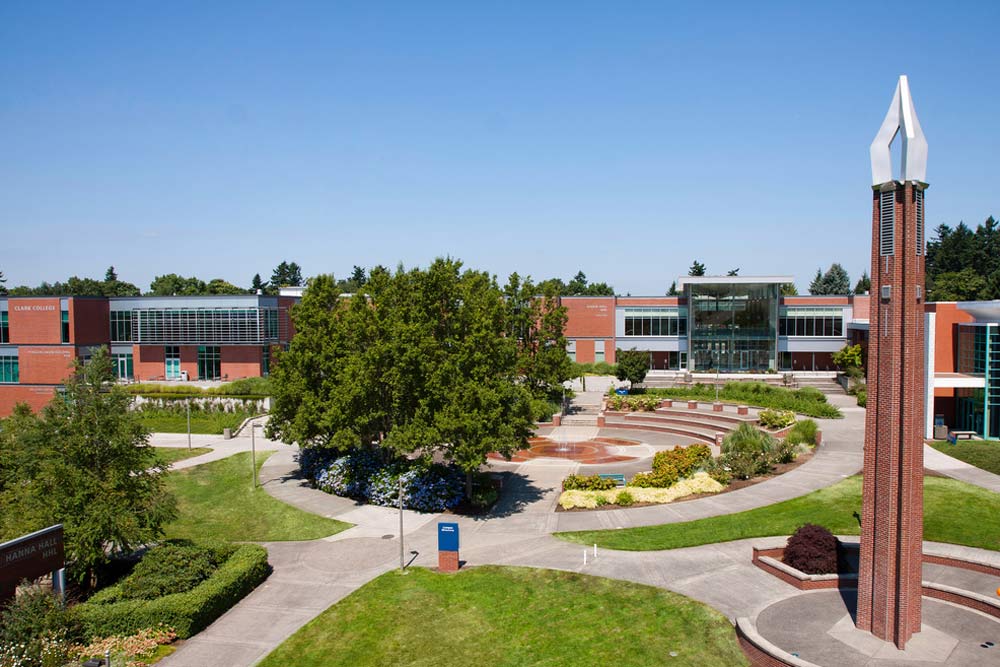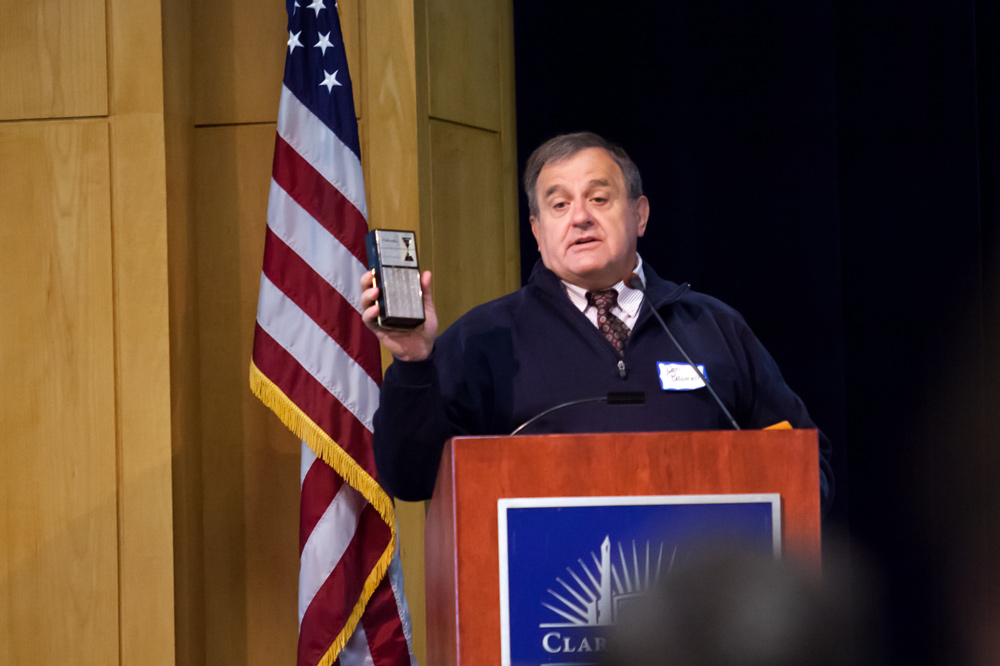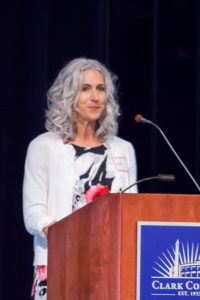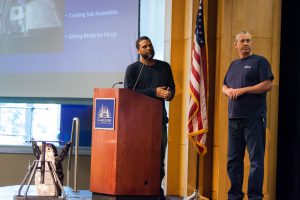
Renee Newman returned as this year’s program emcee.
On March 9, community members gathered in Gaiser Student Center to celebrate three outstanding women for their dedication to Southwest Washington. The 2016 Iris Awards ceremony honored Vancouver City Councilmember Anne McEnerny-Ogle; Katherine Garrett, the Housing First Program Director at Lincoln Place; and Heidi M. Johnson Bixby, owner of Johnson Bixby & Associates.
This annual recognition of Southwest Washington women has a long tradition in this community. The event began in 1985 at Clark College as a photography exhibit during Women’s History Week. Over the years, it developed into a larger awards program and ceremony called the Southwest Washington Women of Achievement Awards. In 2012, the Iris Awards were introduced with the same focus as previous events: celebrating the lasting and far-reaching contributions of women in the community.
The 2016 Iris Award Recipients
Katherine Garrett
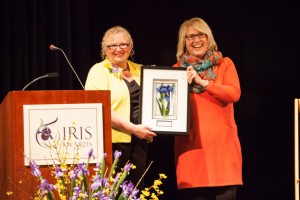
Katherine Garrett, left, with her nominator, Vancouver’s Downtown Association Executive Director Lee Rafferty.
The first woman to be honored during the evening was longtime advocate for the homeless Katherine Garrett, who recently moved from the Vancouver nonprofit Share to the housing program Lincoln Place. During her 14 years at Share—nine of which were spent leading the Share House and Share Outreach programs—Garrett helped transform the organization into one of the major voices for the homeless in Clark County. In her new leadership position at Lincoln Place, a permanent supportive housing program for chronically homeless individuals, she serves as the Housing First Program Director.
Garrett has served as both a strong advocate for the homeless in Clark County and as a liaison between that population and the local business community, working with the Safety Committee of Vancouver’s Downtown Association to help resolve concerns. As the issue of homelessness has gained prominence in recent months, Garrett has been at the forefront of helping city leaders and others understand the issues and make good policy decisions.
“Fourteen years ago, I was given the tremendous opportunity to make a difference each day in the lives of those who are hungry, homeless, and in need of a hand up,” said Garrett as she thanked all those who have supported her throughout her career. “If my work has somehow made people’s lives a little better, then I feel it’s been a success. I would be extremely happy if the outcome of receiving this wonderful award was that others are inspired to make a difference in the lives of the hungry and the homeless of our community. Just one positive action can have a ripple effect.”
Anne McEnerny-Ogle
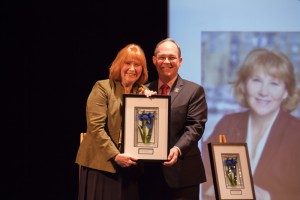
Anne McEnerny-Ogle, left, with her nominator and fellow Councilmember Jack Burkman.
Second to be recognized was Vancouver City Councilmember Anne McEnerny-Ogle, who came to the Vancouver City Council after a 30-year career as an educator during which she received the Milken Foundation Educator Award and was chosen as Oregon Math Teacher of the Year. She serves on a diverse number of boards and is an active volunteer in a number of organizations in Southwest Washington.
Beyond her work on the City Council, which includes the role of Mayor Pro Tem, McEnerny-Ogle is the Chair of the C-Tran Board of Directors, a member of the Regional Transportation Council Board of Directors, and the Vice-Chair of the Clark County Historical Museum. McEnerny-Ogle also serves as Chair for the Fort Vancouver District for the Boy Scouts of America.
As her nomination stated, there are very few volunteer organizations in Southwest Washington that have not benefitted from McEnerny-Ogle’s energy, enthusiasm, and leadership, though she has frequently focused on issues particularly important to women and underrepresented groups. She has worked with the League of Women Voters to help educate the community on important issues and elections, and on the Community Military Appreciation Committee in support of veterans and their families. She is a Leadership Clark County graduate and alumni award winner.
“It’s incredible to look out into the audience into the eyes of so many people who work tirelessly for their community,” stated McEnerny-Ogle as she took the stage to accept her award. “Women’s lives today represent a rainbow of opportunities. Sometimes we clearly understand where we are going, and sometimes we are in the middle of something we never expected.
I deeply appreciate this award and your acknowledgment of my work. I’m having a lot of fun. I am so blessed.”
Heidi Johnson Bixby
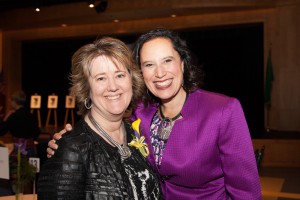
Heidi Johnson Bixby, left, with her nominator and last year’s Iris Award winner Lisa Schauer.
Heidi Johnson Bixby was the final honoree of the evening, receiving an award in a brand-new category. The new Iris Legacy Award recognizes the many women who have continued to make a difference in our community and create a lasting legacy since receiving their initial Iris or Woman of Achievement award. Since 1985, the Iris and Women of Achievement awards have been bestowed on more than 200 women in Southwest Washington.
Bixby is owner of Johnson Bixby & Associates, a comprehensive financial planning firm with locations in Vancouver and Longview. She received a Women of Achievement award in 2004 for her community involvement and business leadership. Beyond her success as a business owner, Bixby serves the community in a variety of roles. She is currently chairs the Board of Directors for Columbia Springs, which provides over 5,000 kids and adults annually with the opportunity to get outdoors and to learn more about the natural world.
Bixby also supports ARC of Southwest Washington, where she and her team have made gift-wrapping of donated items an annual tradition. She is the treasurer for H-RoC and Global Sojourns Giving Circle. Other organizations Bixby supports with her time and resources include Vancouver’s Downtown Association, Community Home Health & Hospice, Identity Clark County, the Nonprofit Network of Southwest Washington, the Clark County Skills Center, and Children’s Center. In addition to her involvement in the community and business accomplishments, Bixby is a world traveler and photographer who has visited more than 30 countries.
“It’s incredible to be the first recipient of this award. It means a lot to me because I do what I love,” said Bixby as she received the Legacy Award. “I’ve lived in Vancouver for nearly 40 years. To me, it is more than where I live. It is my family. It is a piece of me. And I wholeheartedly love giving back. If I can inspire and pass on even a fraction of what has been passed down to me, I’ll be happy to keep the ripple effect going.”
New sponsor and new award
Also new this year was the addition of H-RoC as a sponsor of the Iris Awards. H-RoC was formed in mid-2011 as an independent, non-partisan political action committee specifically to advance women leaders in Southwest Washington. Following this mission, H-RoC announced the addition of another new Iris Award category for 2017 that will honor women who currently serve or have served in public office.
Nominations for the 2017 Iris Awards will open this fall. Anyone may nominate a woman making a difference in one of four areas: service in the public sector, service in the private sector, philanthropic leadership, and service in public office. Up to four Iris Awards may be presented annually. One recipient may be selected in each of four areas. Anyone may submit a nomination. More than one person may submit a nomination for the same nominee or provide letters of recommendation.
For more information about the Iris Awards, visit clark.edu/cc/irisawards.
View photos from the event on our Flickr page.
Photos: Clark College/Jenny Shadley

